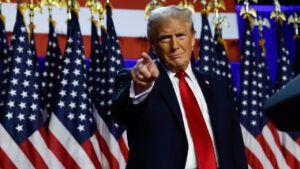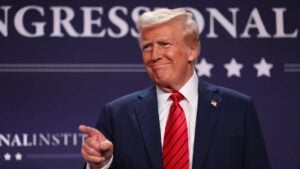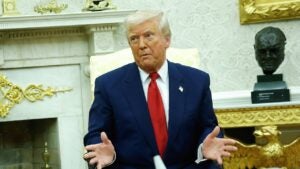Should bond investors beware Trump tariffs? How tariffs are hitting bonds

U.S. President Donald Trump announced tariffs on America’s global trading partners on April 2, and the news sent interest rates up and bond prices down. While Trump has subsequently scaled back some of the tariffs, the ongoing uncertainty about them and his administration’s other plans has caused interest rates to rise as investors expect higher inflation.
Bond investors are carefully watching the potential for the Trump tariffs to stoke inflation, an effect that could send bond prices plummeting, depending on its severity.
How the Trump tariffs are affecting inflation and bonds
On April 2, Trump proposed a range of tariffs on America’s global trading partners, from the tiny to the most important. The proposed high tariffs sent stocks reeling for days, while interest rates on the benchmark 10-year Treasury note soared and bond prices fell. Following a week of this market carnage, Trump scaled back tariffs on non-retaliating countries to 10 percent and has since indicated that tariffs may be negotiated down further. But investors are already pricing in higher inflation from the tariffs by selling bonds and demanding higher interest rates on them.
Americans may be confused about how tariffs work, in part because politicians and others may see it in their interest to mislead them about who exactly pays for tariffs. But here’s the short story: Tariffs are a kind of import tax on foreign-made goods, and they act like a sales tax, increasing the net price of goods. The U.S. government collects the tariff, and American consumers end up paying higher prices on the affected foreign goods if they want to continue buying them.
But tariffs don’t affect just the price of foreign-made products. The prices on American goods also rise, because rival producers now face less competition and can increase their own prices, or new suppliers find it profitable to come on line at higher sales prices. Plus, any American producer that relies on a foreign-made input, such as steel or aluminum, also faces higher prices, so they’ll try to pass on their own higher costs to consumers if they can. Canada is America’s largest source of imported oil, for example, which has wide impacts across the economy.
“The broader effect is an increase in the overall price level, especially if tariffs are broad-based and affect key supply chains,” says Jerry L. Smith, CEP, CLTC, president of JL Smith Associates in Canton, Ohio.
Inflation, if it rises enough, could be the issue that gets the Federal Reserve to raise interest rates, a move that could send shock waves through the financial markets.
Higher inflation means lower bond prices
The financial markets are responding to the potential for tariff-driven inflation by pushing up the yield they demand for bonds and therefore lowering the price of bonds. Bond yields and prices move inversely to one another. If inflation rises enough, it could lead the Fed to raise short-term interest rates to cool the economy and tamp down rising prices.
“Higher inflation expectations tend to lead to higher yields on bonds, especially long-term Treasurys, because investors demand a premium for the erosion of purchasing power due to inflation,” says Smith.
The bond market has already begun pricing in the potential for higher interest rates. Even the day after Trump’s election victory, rates spiked on higher inflation expectations. Yet this expectation conflicts with that of other investors who are anticipating the Fed to cut rates this year.
“If inflation is rising due to higher tariffs, the Fed would be much more cautious about cutting rates, since cutting rates in an inflationary environment could exacerbate inflation further,” says Smith. “For now, I’d say the likelihood of rate cuts is reduced, but they’re not entirely off the table if the economic slowdown becomes more pronounced.”
While the market has been pricing in some higher inflation, the market would be thrown for a loop if investors decide that rate cuts are not merely delayed but fully off the table. And if the Fed actually raised rates, both bonds and stocks could fall significantly, says Steven Conners, founder and president of Conners Wealth Management in Scottsdale.
The tariffs also have the potential to create longer-term structural inflation, too, say experts. If tariffs affect supply chains significantly enough and for long enough, then companies might permanently adjust their sourcing to higher-cost but more stable or available suppliers.
Tariffs have another impact on markets as well, reducing their stability and increasing the returns that investors demand to invest in them. The value of stability to decision makers — whether they’re sitting in boardrooms and C-suites, on professional trading floors or at home trading stocks — is hard to overstate. If markets become more volatile due to shifting and capricious governance, it imposes a cost on those investors, and they want to be compensated for it.
Are any bonds safe from inflation?
Rising inflation impacts almost all bond prices, though investors may have a few places that remain mostly unaffected.
“The only bonds that perhaps would be unaffected would be floating-rate bonds, or short-term Treasury bills,” says Conners.
Floating-rate bonds adjust the interest rate based on factors such as inflation, offering some protection to investors, though they’re not that common. Meanwhile, Treasury bills mature in less than a year, and so remain mostly unaffected by changes in interest rates.
But commonplace fixed-rate bonds would be subject to declining prices if inflation rose substantially, and the longer the bond’s maturity, the greater the impact of a change in rates.
Tariffs could derail the economy, leading to lower interest rates
But events could play out a different way, depending on exactly how severe the effect of the tariffs. If tariffs were so overpowering that they quickly choked off economic growth, the economy might soon tumble, with inflation falling rapidly. In this scenario, the Fed might need to lower rates to help prop up a faltering economy and stoke growth and investment.
If that’s the case, then the slowing economy could lead to higher bond prices as the Fed lowers rates and investors become less demanding amid falling rates.
For example, if America’s trading partners imposed severe retaliatory tariffs, as they’ve threatened, it would hurt exports from the U.S. and cause a slowdown. That could put further pressure on the U.S. economy and slow inflation, and the Fed may be compelled to step in.
It’s a complex situation that depends on a variety of factors, including the sensitivity of the economy to interest rates.
Bottom line
Tariffs are having a negative effect on bond prices as investors price in their expectations of higher inflation. Investors should keep a close eye on how tariffs are actually implemented or whether the Trump administration is using them mostly as a negotiating tactic to get concessions from trading partners.
Why we ask for feedback Your feedback helps us improve our content and services. It takes less than a minute to complete.
Your responses are anonymous and will only be used for improving our website.






